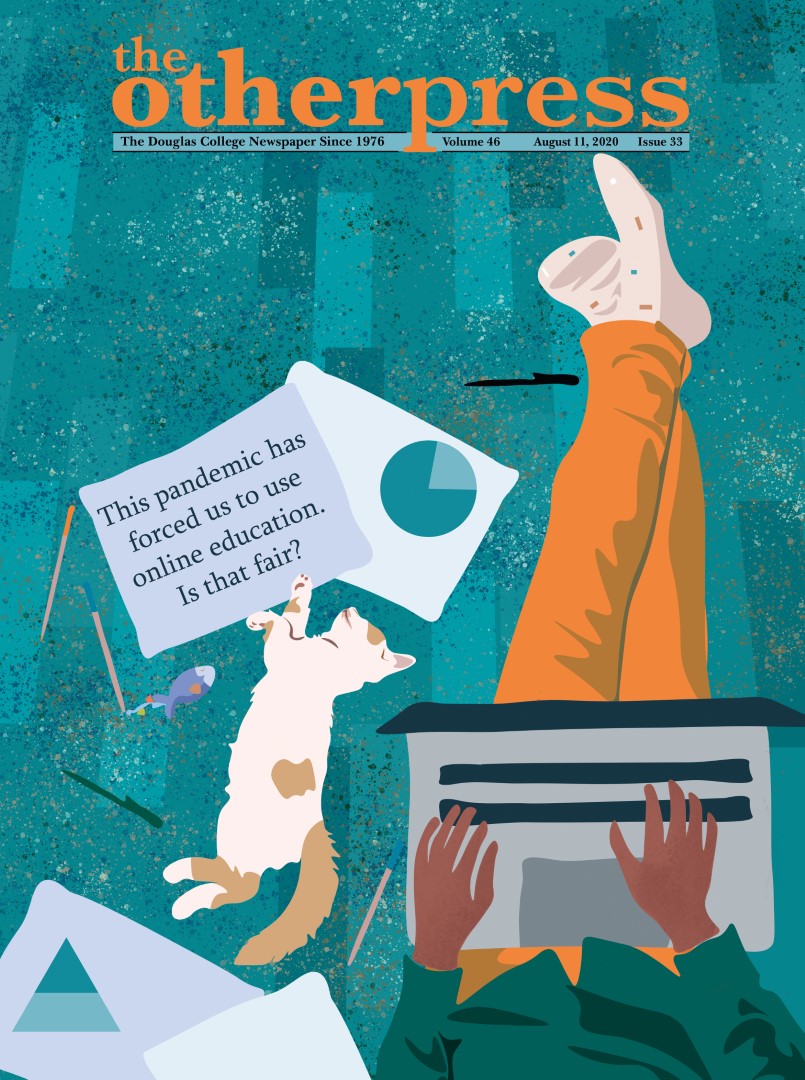
This pandemic has radically transformed schooling—how effective and fair is the change?
By Jessica Berget, Editor-in-Chief and Janis McMath, Assistant Editor
First COVID ruined our summer. Now, it’s ruining our fall semester. At Douglas College, all classes are being held online this semester—much to the dismay of students.
Many students are unhappy with the prospect of a semester at Douglas completely online. Take student Craig Allan for instance. On his online summer semester, he states: “The classes I have been in have consisted of a lot of my classmates not really participating, which limits the teaching. I do think I would prefer online classes if they were properly designed. Not having to drag myself to campus or spend money on parking or a U-Pass would be great, and I would have more time to study or work after school since I am not spending what could be two to three hours on transportation every day,” he said.
Most schools are pouring salt into the wound as many post-secondary institutions are also not lowering their tuition rates or refunding fees. Some schools, like Simon Fraser University and University of British Columbia are going ahead with the scheduled fee increases too. Douglas College says their fees have not changed because students are still receiving full credits for these courses and that they are still able to use many of the school’s services, even if they are delivered alternatively. Yet many people, even Douglas College English Professor Chris Maguire, have called for tuition lowering because of the shift to online teaching and the controversy of how ineffective online classes are. Which begs the question: is online schooling worse than face-to-face instruction?
Arguments against online
learning
One of
the first and perhaps most obvious cons of online learning is how autonomy can
be harmful in learning for many students. A contemporary study
concludes that direct instruction is a big part of student success. A survey by
the Angus Reid Institute resulted in similar findings—60 percent of students
say they feel unmotivated and 57 percent said they disliked the current
learning arrangements. In a CTV News article, Preston Sauciukas (a Grade 7
student from Brantford) weighed in on the issue: “It’s really hard to focus
because I have siblings and stuff all around the place.” He also said that he
found it hard to ask his mom for help since she was busy with his younger
brother and sister.
Another contentious issue to consider is cheating. Online at-home exams obviously pose a threat to the academic integrity of the grading system and scale. Many classes are graded on a curve—so if students cheat, it can very literally impact the grades of students who did not cheat and were deserving of a higher grade. And the solutions for this issue aren’t exactly perfect either; Vancouver resident Caitlin Barker had to do her exam for her Ontario university under the careful watch of a security officer looking at her through a webcam for three hours. Many factors can influence how well a student takes a test (e.g., test anxiety), so it could be possible that such a method of security would actually decrease student scores.
The positives of online learning
While it is obvious there are many educational benefits that come with face to face instruction, there are also many perks in online classes to consider. For instance, say goodbye to that pesky morning commute. According to a 2019 Bloomberg article, the average student’s commute is about 18 minutes long. The most common commute averaged at five to ten minutes, and a small percentage of students have commutes that go over an hour. Also consider the money you could be saving on gas and food from going to and from campus every week. And, clearly, a lack of transmission of diseases and illnesses comes with online classes. However, this is all “silver-lining” speculation.
Why do only post-secondary students have to do online classes in the fall?
In May, Dr. Bonnie Henry said in a Province of BC video to teachers and staff that all schools were safe to open and described safety measures that have been put in place. Elementary and high school classes are beginning in-person teaching in September with a regulated number of students. It is worth mentioning though that many teachers and students have said they are afraid going to school. Some teachers are even suggesting students to wear masks. Yet nearly all universities are continuing with solely online teaching. Why is Douglas, and many other post-secondary institutions, not allowing in-person classes with some regulations? Some say it is to reduce the possibility of spreading COVID and to keep students safe, but this contradicts expert Dr. Bonnie Henry’s statement about schools being safe to open.
Others argue the reason for having online classes only is colleges and universities catering to international students because of the money the school makes off of them. A Vancouver Sun article argues this point efficiently; foreign students often pays fees four times that of local pupils and this shows in the $22-billion dollars international students bring in annually. A Kwantlen Polytech University political scientist, Shinder Purewal, claims in the aforementioned article that his school would suffer without international students. “[KPU] relies so much on international students that it would collapse as an institution without their money. Douglas College may also be in the same boat in that regard. According to their 202o international viewbook, in 2019, Douglas hosted 3,700 international students from 90 different countries. According to the Douglas website, international student tuition currently is priced on a per credit basis. One full year of studying at Douglas costs international students about $18,000—plus fees of course. That’s about $66,600,000 dollars in tuition in 2019 if all those students studied for a full year. Having in-person classes, and thereby shutting out international students who left and cannot come back because of border closures, would certainly be a hit for the
Why isn’t tuition being lowered?
As mentioned before, UBC and SFU are going ahead with scheduled fee increases. But it is also important to mention no UBC or SFU workers have lost their jobs due to COVID-19 as reported by the Vancouver Sun. While that is a positive, it can also be viewed as a negative. In some comparable Canadian universities, much of the budget is spent on paying the staff. According to a CBC article, “At Dalhousie University in Halifax, for example, compensation for faculty and staff is 72 percent of the total budget.” On this contentious issue, Douglas College English Professor Chris Maguire states that he knows students that use the food bank, so we should be reducing tuition. Thor Borgford, academic vice-president and provost at Douglas acknowledges the difficulty of the transition to distance education, but states this: “While the delivery format of our courses has changed, these courses continue to be taught by the same experienced faculty as they would be in person.”
While is it true that the same experienced teachers will be available, Maguire does not believe that the quality of the education will be up to the same standard: “We weren’t prepared to do this. We pulled it out in a fortnight,” he states of the teachers creating online course material. “Mostly it wasn’t that terrible but if you teach skills like I do in languages, it’s not like I can just lecture—I have to do it synchronously with the class, I can’t do it asynchronously like some courses.”
While elementary and high schools get into full swing next month, post-secondary institutions err on the side of caution by keeping with online class delivery. Whether it be for financial concerns or the health and safety of students we will never know. It may sound like a nightmare to students now, and it may seem like there are more cons than pros in online education—however, there are also many perks of online classes that go overlooked and we should all keep an open mind about the upcoming semester.


